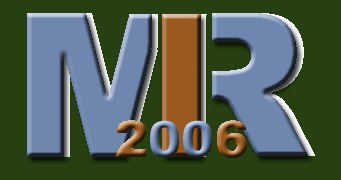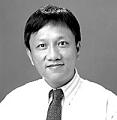Keynote Speakers
The MIR workshop this year will feature two keynote speakers.
Interactive Image Retrieval by Mental Matching
Donald Geman, Professor, Johns Hopkins University
In "query-by-visual-example," the standard scenario in image retrieval, the "query image" resides in the database and is matched by the system with other images. Suppose, instead, the query image is "external" and the matching is "mental." For instance, an image resides in the mind of the user or there is an actual object or photograph. The user may seek versions of the same image, e.g., the same face, or images belonging to the same class, e.g., similar landscapes, and responds to a sequence of machine-generated queries designed to accelerate the search. For example, the user declares which of several displayed images is "closest" to his query. These similarity decisions are entirely subjective and user-dependent. I will discuss an interactive search engine which is based on information theory and statistical inference. The display algorithm involves a Bayesian relevance feedback model and an optimality criterion based on conditional entropy. Performance is measured by the expected number of iterations necessary to match the identity (target search) or the class (category search) of the query. Designing metrics and response models which are consistent with human behavior is essential for achieving practical results with large databases, as illustrated with art and faces.
Biography: Donald Geman received his Ph.D. in Mathematics from Northwestern University and was Distinguished Professor at the University of Massachusetts until 2001, when he joined the Department of Mathematical Sciences and Whitaker Biomedical Engineering Institute at Johns Hopkins University, where he is now Professor. He works at the intersection of applied mathematics and computer science, specializing in stochastic analysis, vision, learning and bioinformatics. With more than 4,500 recorded citations by google scholar, his paper on stochastic relaxation, Gibbs distributions, and the Bayesian restoration is the most cited imaging-related work.
Unified and Scalable Learning in Multimedia Information Retrieval
Edward Chang, Director R&D, Google China; Professor, University of California at Santa Barbara
Statistical-learning approaches such as unsupervised learning, supervised learning, active learning, and reinforcement learning have generally been separately studied and applied to solve application problems. In this talk, I will present our recent work on a unified learning paradigm (ULP). ULP is motivated by how human being acquires knowledge: we learn by being taught (supervised learning), by self-study (unsupervised learning), by asking questions (active learning), and by being examined for the ability to generalize (reinforcement learning). I will present our recent ICML and KDD papers on ULP, which can substantially reduce the amount of required training data. I will also present our proposed algorithmic and data-processing techniques to speed up kernel-based learning for multimedia information retrieval. I will touch basis on how my new role at Google relates to the multimedia community.
Biography: Professor Edward Chang received his M.S. in Computer Science and PhD in Electrical Engineering at Stanford University in 1994 and 1999, respectively. He is Professor of Electrical Engineering at University of California, Santa Barbara. His recent research activities are in the areas of machine learning, data mining, high-dimensional data indexing, and their applications to image databases, video surveillance, and Web mining. Professor Chang is a recipient of the IBM Faculty Partnership Award and the NSF Career Award. He is now on leave and serves as the R&D Director of Google China.



